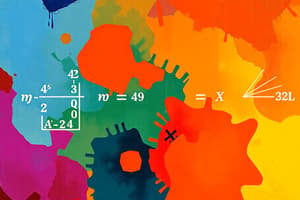Podcast
Questions and Answers
What are the core algebraic operations?
What are the core algebraic operations?
- Addition, division, subtraction, factorization, simplification
- Addition, subtraction, multiplication, division, exponentiation (correct)
- Subtraction, multiplication, exponentiation, addition, simplification
- Addition, subtraction, division, multiplication, simplification
What is the first step to solve the equation: $x + 3 = 7$?
What is the first step to solve the equation: $x + 3 = 7$?
- Add 3 to both sides
- Multiply by 7
- Subtract 3 from both sides (correct)
- Divide by 3
What type of equations involve only one variable and a constant?
What type of equations involve only one variable and a constant?
- Quadratic equations
- Linear equations (correct)
- Exponential equations
- Polynomial equations
Which method can be used to solve systems of linear equations?
Which method can be used to solve systems of linear equations?
What do algebraic identities help us do?
What do algebraic identities help us do?
What does algebra provide for manipulating and solving equations?
What does algebra provide for manipulating and solving equations?
What is the origin of the word 'algebra'?
What is the origin of the word 'algebra'?
Which mathematician is credited with systematically presenting algebraic techniques in the 9th century?
Which mathematician is credited with systematically presenting algebraic techniques in the 9th century?
What does algebra provide a framework for within mathematics?
What does algebra provide a framework for within mathematics?
Why is algebra considered a gateway to higher-level mathematics and scientific understanding?
Why is algebra considered a gateway to higher-level mathematics and scientific understanding?
How does algebra contribute to understanding the natural world in fields like physics, chemistry, and engineering?
How does algebra contribute to understanding the natural world in fields like physics, chemistry, and engineering?
Which ancient civilizations contributed to the early development of algebraic methods?
Which ancient civilizations contributed to the early development of algebraic methods?
Flashcards are hidden until you start studying
Study Notes
Mathematics: Unraveling Algebra's Foundational Role
Mathematics, a language of logic and order, encompasses a wide array of subjects that arise from our quest to understand patterns, make predictions, and solve problems. One of the most powerful and fundamental tools within mathematics is algebra, providing us with a framework to manipulate and solve equations in a systematic, organized way.
What is Algebra?
Algebra is a branch of mathematics that deals with symbolic expressions and their manipulation, relationships between variables, and the solving of equations. The word "algebra" originates from the Arabic word "al-jabr," which means "restoration" or "completion." Early algebraic methods were developed by mathematicians like Babylonians, Hindus, and Greeks, but it was Persian mathematician Al-Khwarizmi who systematically presented algebraic techniques in his book Hisab al-jabr wa'l-muqabala in the 9th century.
Why is Algebra Important?
Algebra is a gateway to higher-level mathematics and scientific understanding. It helps us develop the ability to reason abstractly, think logically, and solve problems in a systematic and organized manner. Algebraic thinking is essential in understanding more complex mathematical concepts, such as calculus, geometry, and statistics. Algebra also provides a strong foundation for understanding the natural world in fields like physics, chemistry, and engineering.
Algebraic Operations and Equations
At the core of algebra are operations on variables and expressions. These operations include addition, subtraction, multiplication, division, and exponentiation. Algebraic equations are statements that equate two expressions, which may contain variables. Solving these equations involves finding the values of the variables that satisfy the equality.
For example, consider the following equation:
[ x + 3 = 7 ]
To solve this equation, we subtract 3 from both sides of the equation, yielding:
[ x = 4 ]
This value of (x) satisfies the original equation.
Linear Equations and Systems of Linear Equations
Linear equations are the simplest type of algebraic equations that involve only one variable and a constant. Solving linear equations is a fundamental skill in algebra, and it provides a stepping stone to more complex types of equations.
Systems of linear equations involve two or more linear equations with the same variables. Solving systems of linear equations helps us determine the relationships between variables and the unique solution(s) of the system. There are numerous methods to solve systems of equations, such as graphing, substitution, elimination, and matrices.
Algebraic Expressions and Identities
Algebraic expressions are mathematical statements that involve variables and constants. Expressions can be combined and manipulated using algebraic rules and properties. For example, the commutative property of addition states that the order of adding numbers does not change their sum.
Algebraic identities, on the other hand, are equations that are true for all values of the variables. These identities help us simplify expressions and solve problems. For instance, the distributive property of multiplication states that (a(b + c) = ab + ac).
Conclusion
Algebra is a foundational tool in mathematics that provides a systematic and organized framework for manipulating and solving equations. Whether you're studying for a math class, attempting to understand a scientific concept, or simply trying to make sense of the world around you, algebra will be by your side. As you explore the fascinating world of algebra, you'll hone your problem-solving skills, develop your abstract reasoning abilities, and gain a deeper understanding of the mathematical world.
Studying That Suits You
Use AI to generate personalized quizzes and flashcards to suit your learning preferences.




